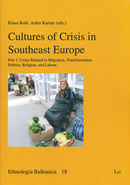Volume 18
Ethnologia Balkanica
Journal for Southeast European Anthropology
Zeitschrift für die Anthropologie Südosteuropas
Journal d’ethnologie du sud-est européen
Volume 18/2015
Cultures of Crisis in Southeast Europe. Part 1: Crises Related to Migration, Transformation, Politics, Religion, and Labour
Edited by Klaus Roth and Asker Kartarı
LIT-Verlag 2016, 410 p., ISSN 1111-0411, ISBN 978-3-643-90763-9
Southeast Europe’s history of the last two centuries is marked by deep transformations and upheavals. The emergence and disappearance of states, ethnic conflicts and wars, changes of political systems, economic crises, migration movements and natural disasters. Most of them have been experienced as deep crises forcing people to adapt to often radically new situations. Often crisis management became a permanent way of life.
The book focuses on the cultures of crisis, on the reactions of societies or individuals to them: on their impact on everyday life, on peoples’ strategies of coping, on the processes of adaptation, and on peoples’ attitudes. This volume concentrates on crises relating to migration and post-socialist transformation, to politics and religion, and to labour relations.
Klaus Roth is professor em. at the Institute for European Ethnology of the Ludwig-Maximilians-University Munich. Asker Kartarı is professor of communication at the Advertising Department of Kadir Has University, Istanbul.
Contents:
Editorial
Introductory
Asker Kartarı, Istanbul
The Gezi Park Protests of 2013. An Observer’s View of a Political Crisis
Christian Giordano, Fribourg
Transition/Transformation and Crisis. Investigating Southeast European Societies Through Conceptual Expedients
Migration and Diaspora
Sabine Strasser, Bern
The Crises Effect. Global Moral Obligations, National Interventions and the Figure of the Pitiful/Abusive Migrant
Marijeta Rajković Iveta, Zagreb
Women and Migrations in Croatia. From Marginal Subjects – “White Widows” – to Contemporary Migrants into the EU
Jadranka Đorđević Crnobrnja, Belgrade
Crisis, Migrations, Culture. On the Influence of the Economic and Political Crisis on Migration Patterns of Gorani People and Changes to Their Culture
Ivaylo Markov, Sofia
Migration, Trans-Locality and Social In(Ex)clusion. Managing the Life In-Between. The Case of Albanian Migrants from Macedonia
Michal Pavlásek, Brno
In a New Homeland. Adaptation Strategy and Overcoming Discontinuity of Czech Migrants in Banat
Ceren Ark, Paris/Istanbul
The Politics of Uncertainty. Perceptions of Urban Transformation in an Internal Migrant Neighbourhood of Istanbul
Karolina Bielenin-Lenczowska, Warsaw
Save Radika. Environmental or Political Activities and the Local Conceptualization of the Concept of Diaspora
Yana Yancheva, Sofia
The Bulgarian Diaspora in Moldova and Ukraine in the Context of Agricultural De-Collectivization. Social and Economic Consequences for Everyday Life
Society, Religion and Politics
Elife Krasniqi, Graz
Social Changes in Relation to Patriarchy in the Post-1999 War in Opoja, Kosovo
Gerda Dalipaj, Aix-en-Provence
“The End of History” Is a “State of Emergency”. Informal Constructions, Legalisation Laws, and the Production of Permanent Crisis in Post-Communist Albania
Evgenija Krăsteva-Blagoeva, Sofia
Clothing and Fashion in a Time of Crisis. The Case of Kărdžali
Tahir Latifi, Graz
Poverty and Social Security from the Perspective of Post-War Political, Societal and Family Transformations in Kosovo. Macro- and Micro Level Points of View
Zsuzsa Plainer, Cluj-Napoca
“All Gypsies were living there as sound as a roach”. Heydays of a Roma Colony in Oradea (Romania) and Its Wrecking in Socialist and Post Socialist Times
Marija Mandić, Belgrade
Unifying the Other. The Case of the March Violence in Kosovo and the Mosque Burning in Belgrade
Violeta Periklieva, Sofia
“Dreaming” Saints and Building Chapels in Times of Crisis. The Case of Angelci, Macedonia
Work and Labour Relations
Tanya Chavdarova, Sofia
Invisible Ink. The Hidden Clauses in Employment Contracts in Bulgaria
Dražen Cepić, Birmingham
The Crisis of Working Class Sociability in Croatia. Challenges of De Unionization
Ivanka Petrova, Sofia
Working after 1989. Cultural Strategies for Economic Survival and Coping with the Crisis in the Sphere of Labour
Sanja Potkonjak, Tea Škokić, Zagreb
Retro-Utopia. On the Idea of Work and Progress in Post-Socialist Croatia
Marek Mikuš, Goran Dokić, Halle
“Nobody’s Stronger than the State”: Crisis and Hope among Serbian NGO Workers and War Veterans
Addresses of Editors and Authors
Instructions to Authors


